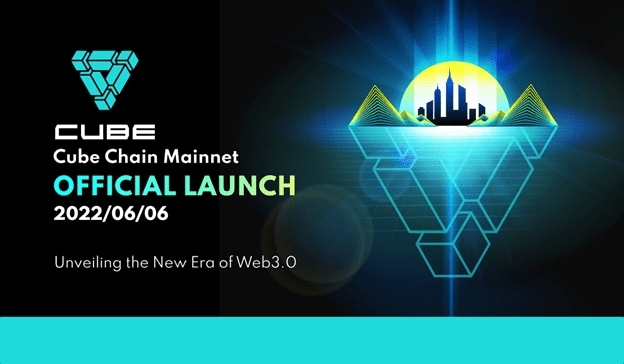

[PRESS RELEASE – Please Read Disclaimer]
World’s leading public Web3 blockchain, Cube Chain, on Monday announced the launch of its Cube mainnet — the end product of Cube Chain’s blockchain project that is accessible by the public.
Cube Chain is a new, modular and permissionless blockchain designed based on multi-chain architecture. Similar to various public chains such as Ethereum and Polkadot, Cube Chain is committed to resolving the blockchain’s trilemma — a widely-held belief that decentralized networks can only provide two out of three benefits at any given time with respect to decentralization, security and scalability.
The popularity of large-scale applications of blockchain technologies such as GameFi, DeFi and NFT, have fueled market need for public chains that encompass high performance and advanced security while maintaining scalability. Cube Chain fully intends to fulfill all three criteria while catering to market demand, and early reception from the public contains strong success indicators. Since its testnet (blockchain used for testing and experimentation) was launched on May 25, transaction volumes have exceeded 1.7 million, while the total number of addresses has exceeded 134,000.
A slew of next-generation features the places Cube Chain in an ideal position to solve the blockchain trilemma while meeting the needs of the blockchain market.
The key architecture behind Cube Chain splits the functions of the blockchain more systematically to optimize performance, security and scalability. Cube Chain is designed with the execution layer for transaction execution by using the ZK Rollup-based Validium solution and a self-developed Collaborative Rollup solution as the system’s execution engine.
Consensus-wise, Cube Chain uses a settlement layer that is fully compatible with EVM and Ethereum protocols and introduces a high-performance consensus protocol that supports large-scale node participation. With respect to raw data storage for transactions, Cube Chain has a data availability layer that implements block data sharding and sampling validation schemes to provide efficient and reliable storage services.
For Rollup and NFT applications, there is no longer a need to rely on external storage solutions as the processing logic and data are fully managed. In addition, Cube Chain has developed a decentralized cross-chain communication protocol named “Time Crossing”, which supports cross-chain DeFi contract calls and is compatible with the Cosmos IBC protocol.
Huobi Global, the world’s leading crypto exchange, has listed the CUBE token on Primelist at 13:00 (UTC) on June 6 2022. Primelist is a new token listing platform on Huobi Global that showcases high-quality tokens. With Primelist, participants stand a chance to buy CUBE tokens at low prices and trade them when the event ends.
“The mainnet launch signals an important milestone in Cube Chain construction. Moving forward, Cube Chain will continue to develop and maintain its chain with a more modest attitude and a more dedicated spirit,” said Jake Stolarski, CEO of Cube. “Active ecology is also the focus of Cube’s future construction, and we hope more users, assets and projects can be better developed on Cube Chain.”
For more information about the Primelist of Cube Network, please visit here.
For more information about Cube, please visit: https://www.cube.network/
About Cube Chain
Cube is a high-performance, scalable and modular layer1 public chain, capable of supporting multi-chain and cross-chain architecture. Compatible with EVM and Cosmos ecosystems, Cube is actively committed to participating in the development of decentralized cross-chain protocols and Web3.0 infrastructure to provide users with the next-generation multi-chain experience.
Contact Cube Chain
Twitter:https://twitter.com/Cube0x
Telegram:https://t.me/Cube_Network
Binance Free $100 (Exclusive): Use this link to register and receive $100 free and 10% off fees on Binance Futures first month (terms).
PrimeXBT Special Offer: Use this link to register & enter POTATO50 code to receive up to $7,000 on your deposits.
The post appeared first on CryptoPotato






